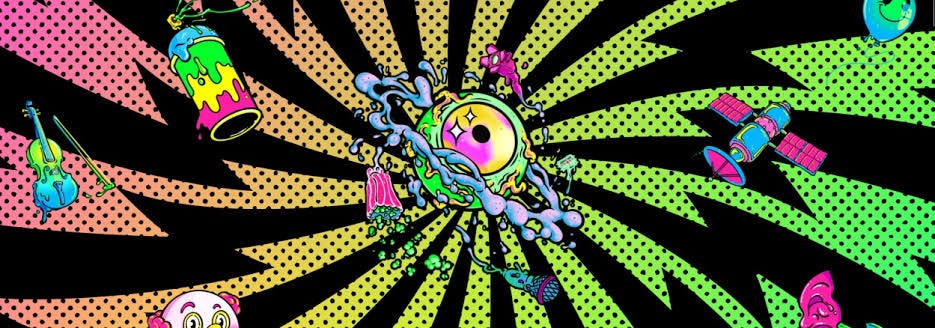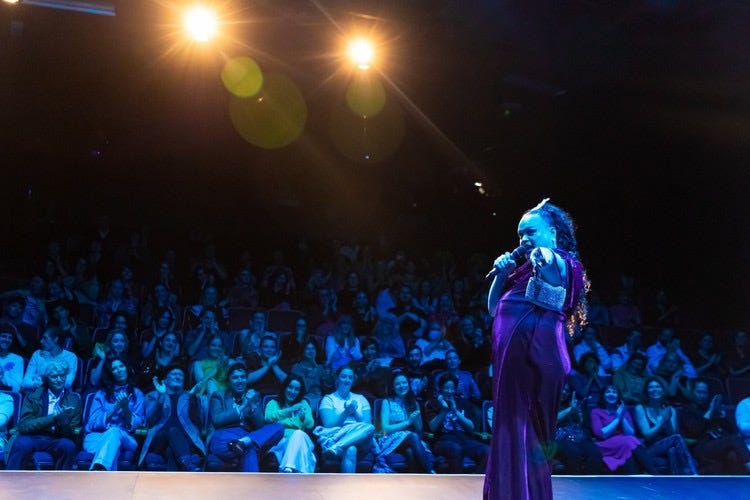How A Creative Sector Dies
The cancellation of the Auckland Fringe Festival is a canary in a coalmine
Art is inevitable, eternal, inexhaustible, unsuppressable. It comes from a place deep within ourselves; it comes from the spaces deep between ourselves, and it connects us like a tether. Even when it’s silly or funny or rude or violent or immature or enigmatic or conventional or bad.
(Name a filmmaker more unifying than Tommy Wiseau, I challenge you.)
You cannot kill art. You cannot keep it from emerging like flowers bursting through the snow. Art comes from us, and so long as there is us, there will be art. You cannot kill it.
But you can kill a creative sector.
Economies are not nearly so robust, and have been known to fold at the faintest of winds, like a house of cards built unprotected from the breeze. News of oncoming tariffs, for example, could bottom out a film industry that relies on financial incentives to draw projects to our shores, destroying the demand for the thousands and thousands of skilled film and television workers we have dedicated the last 50 or so years to training up.
Industries can also crumble from the top down when a key support is removed. And if I learnt anything from transcribing several hundred hours of demolition footage for reality tv, it’s that you never quite know for sure which substructure it is that’s holding the whole thing up.
That’s alright though. In demolition, the point is to bring it down.
I would like to think that’s not true of our creative sector.
The Auckland 2025 Fringe Festival was cancelled yesterday. The article announcing it, currently the only news piece on the topic, begins with the line, “When you exist on the fringe, very little comes easy.”
It’s a line that will resonate deep within anyone in New Zealand’s creative sector, born as it has been of passion and number 8 wire. It’s not just that the arts attracts the marginalised; queer people seeking to express themselves, people of different cultures seeking to communicate and connect, the young looking to find their voice, the old trying to tell their stories, the inventors and innovators and the people who think different who got pulled in along the way. It’s that the very community exists on the margins.
At this point, I’m pretty sure my full time job is “Mental Illness”. But I was in the creative sector once and I’d like to hope I will be again, and so I know that all the “creative sector” is the people that make it up.
Our creative sector as an industry is young, especially our film sector, our most commercially viable output so far. It was built off the talent and work of mavericks and pioneers, forging ahead into a landscape that did not yet exist, sculpting it as they went for all those who came behind. Goodbye Pork Pie was filmed on a tin can with some string by some people who’d never put together a feature film in their lives, but damn if it isn’t one of the best roadtrip films ever made, while people like Peter Jackson have grown and built the industry and infrastructure around these works of art that gave these film workers a home. So many of our film crews started out into the industry back when there wasn’t an industry, not really, but they built it up behind them, and they built it really well. So even though Trump’s tariffs don’t affect me right now, my heart is in my mouth for all the hard-working people whose livelihoods now rest on the whims of a wannabe-tyrant.
That’s how I know that everyone in the creative sector can understand how big a blow losing an event like the Fringe Festival will be. While kiwi comedy wasn’t my scene, they all overlap, and any professional sphere requires a hell of a lot of talent development to, well… develop talent. That’s why the Film Commission has a department called “talent development”.
When you’re building and sustaining an industry, you have to recognise that usually creatives like Peter Jackson and Jane Campion don’t just create themselves. Sure, some outstanding examples pop up as stray shoots, but if you want to cultivate an entire pool of people to work on commercial enterprises, you have to put a little bit more effort in than that. And you do need a whole pool of talent, if you want enough people for a) a film crew and b) an industry.
New Zealand does have a comedy industry. It’s not huge, but it exists, and it has a global recognition that you can’t buy or create artificially. While the likes of Flight of the Concords and Billy T James made our name for us, that name will be forgotten very quickly if we aren’t loud enough or funny enough.
You can draw lines between the funding that goes into people and projects and the international outcomes and results we see. Rhys Darby is an internationally-known Kiwi comedian who some may have thought had already “had his day” — before Black Sails came out and took the internet by storm. Even though it’s not a kiwi production, just the combination of Taika Waititi and Rhys Darby makes it one. It is kiwi comedy on the world stage, with international netflix funding, not because it’s being “funded” for the sake of funding it, but because of the commercial-level international talent of those involved. That production represents forty years of Film Commission Funding, starting with the short Two Cars One Night and continuing through to Boy and Hunt for the Wilder-people, two rare examples of kiwi films that actually made a profit, and continuing on to kiwis giving other kiwis jobs on international productions.
Without that investment, Taika Waititi may have kept making art, but who’s to know where he would have ended up or how far he would have made it internationally. He certainly wouldn’t have been creating some of the only profitable projects the film commission has ever produced and returning it to the commission to make more.
Anyone who wants to get up in front of an audience for the first time and do stand up comedy is, in my opinion, insane. And without that insanity, the world would be a less funny place. The Auckland Fringe Festival is an entranceway for talent to find their way through to bigger stages, especially to other international fringe festivals that have even more opportunities for comedians starting out their careers.
It’s not where new comedians start — someone performing at a Fringe Festival for the first time may have been performing and writing and honing their craft for years; testing their nerve in dark bars and small comedy clubs, learning how to work a crowd and developing the skills so that when they hit our TV screens, they’re already funny. The low-level work that makes people professionals is done at an amateur level first, and then opportunities like the Fringe Festival allow budding creatives to take that next step up.
The Fringe Festival cancellation is pretty sad for comedy performance enjoyers too. Comedy festivals can create a big buzz, draw international talent to our shores, get names and faces and anecdotes of great performances out there that get new or returning punters keen to see a show. The sort of ripple effects of a successful scheme that creates more conditions for an industry to thrive.
I’m not going to let this announcement make me mourn for New Zealand comedy as an art form; the news is miserable enough already, and the people who would have performed these shows are still out there. You can probably find them for very cheap ticket prices at your local amateur comedy venue, where our comedians are really created.
Hopefully this cancellation might motivate me, and maybe some other people, to grab tickets to see them.
But the Fringe Festival would have brought these performers to the fore, letting us identify the showmen and women and comedians of other genders who shine on stage, showcasing them to New Zealand and the world. Without those opportunities, it is harder for a creative to make it in the world as a creative, as an artist, and so I have huge sympathies and anger for those whose plans and goals for their career and lives will be stalled by this cancellation.
Without funding, things fall apart. You may be surprised how much “wasteful spending” was propping some pretty important things up.







The potential for art to carry New Zealand’s story proudly into the world is immense, mammoth, astronomic. And what travels with story? Let me put my marketing hat on for one sec here. Right, it’s on. Now…what travels in lockstep with story is value. If New Zealand’s stingy, parsimonious, and closefisted government wants to free the nation from its price-taking commodity trading manacles, then it must enlist the help of artists, writers, and all the talent that lives in the creative ecosystem. It’s that simple. Imagine harnessing all that power. Wow! You could see that light from the cosmos.
The problem New Zealand faces is its political system isn’t working and Neoliberal managerialists like Luxon have acquired power. That’s bad because their corporate institutionalisation literally disconnects their creative wiring and replaces it with thinking that is reductionist, efficiency driven, and short-term. It is never human centric. It is the road to Gehenna and we’re all on it.
It seems many things will gradually become obvious over the next few years - as the media influence expands even further? Over the first quarter of this 21st Century the pervasive media impact has expended so much - and with such a mix of valid and invalid detail that it seems we will need to urgently filter out that which is important and that which we can ignore. Simplifying the complexity of our World can never be the answer - as our present political powers try to do. Simple solutions or Banns will not solve the issues - either our present political power are woefully ignorant or they are deliberately spinning propaganda for ulterior motive. Neither is acceptable for our needs as a community of humans and both a failure of their responsibility.